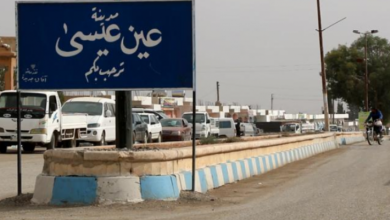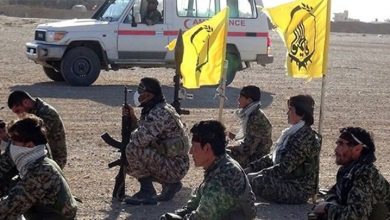
Talks abounded about U.S. negotiations with the Syrian regime regarding the release of Austin Tice, an American journalist who went missing near Damascus in 2012 and hasn’t been heard from since.
Donald Trump’s administration considers the return of the kidnapped Americans from several countries in the world as one of the underpinnings of the foreign policy in which it’s proud to have achieved a reckoning success for releasing many American citizens who were kidnapped by North Korea, Iran and the Houthi in Yemen.
But the case of the Americans kidnapee in Syria is still without a solution, which pushed the U.S. to communicate with Bashar al-Assad’s regime after being on hold during Barack Obama’s mandate.
The underway talks are more soberly and at a high American level, fueled by relentless pressure by the parents of Tice who did not stop pleading for help. They urged numerous U.S. officials on this humanitarian issue since it has become one of Trump’s foreign policy foundations.
Trump boasts that his administration is bringing back the kidnapped Americans without offering financial bribes or political concessions, not as the Obama administration used to do.
There are serious attempts almost once a year, as reports of American officials’ visits to Damascus have been leaked.
The most recent of which is what was published in the Wall Street Journal on October 18, where it was mentioned that Trump’s advisor for counterterrorism affairs visited Damascus this year, such a visit was also preceded by the visit of the head of the missing portfolio in the State Department and a US intelligence official two years ago.
The U.S. Secretary of State Mike Pompeo confirmed in August that President Trump had sent a letter to Assad last March, with the aim of negotiating the release of the kidnapped journalist.
The American government has confirmed contacts without going into details except that nothing resulted from them, but recently the US National Security Adviser said that they have indications that the journalist is still alive.
The U.S. Secretary of State Mike Pompeo confirmed in August that President Trump had sent a letter to Assad last March, with the aim of negotiating the release of the kidnapped journalist.
Pompeo said that the U.S. government has repeatedly tried to communicate with Syrian officials to release Tice, while the former U.S. Secretary of State John Kerry sought in 2014 repeatedly to resolve the case, but the Assad regime refused to cooperate.
This is Assad’s game as the regime indirectly leaks information and details to the Americans about the kidnapped journalist without adopting this information, and the idea is formed among the Americans that the journalist is held by the Syrian regime and there must be dialogue with Damascus in order to be released.
The Assad regime demands that the American delegation must be at a high representing level in order to satisfy its ‘ego’ and mental illness.
Later, it seems that he has legitimacy and that he is still in the focus of international attention, and that all the talk about the political transition and the Geneva’s peace process is a waste of time and is not serious from the American sponsor.
Assad is eager to revive relations with the White House even through the hostage-diplomacy and ahead of the presidential elections.
He wants a dialogue with the Americans that paves the way for normalizating relations and restoring its legitimacy throughout a gradual process, starting by an important file for the American side, which is in the case of Austin Tice and linked to other files such as combating terrorism. For example, where there were channels for indirect exchange of information. It is possible to request that It is a direct channel, periodic meetings, and move to a second file.
But if he does not get what he wants, as it’s happening now, he will raise the ceiling of his political rhetoric and talks about everyone’s demands that he knows will not be fulfilled.
There’s a doubt for the American administration that the journalist is taken hostage by the regime and the Syrian regime is maneuvering, what may put all the American possibilities and capabilities on the table to be restored when it is needed.
The current and previous US administrations were not interested in developing relations with Assad for political, legal and ethical reasons related to war crimes against the Syrian people, in addition to the absence of anything the regime could provide separately from the Russians and Iranians, who are in constant contact with the Americans, directly and indirectly. For that, the US talk with the regime is only about Tice and from a humanitarian point of view,
The Americans can provide more financial assistance to the United Nations for its projects in Syria or turn a blind eye to smuggled oil cargos, no more than that.
“Asma al-Assad requires a CT scanner, worth approximately $15 million, to be purchased from the UAE in exchange for the journalist, he said.
Recently, unrelated facts have emerged suggesting that something is going on to solve this issue.
In a closed session organized by research centers in Washington, attended by approximately 20 people and allowing share of ideas presented without mentioning the name of the person, one of the Syrians close to the Syrian political opposition said that he works as a mediator on the issue of the kidnapped American journalist and that the Syrian side is working with Asma al-Assad, Bashar’s wife that turned the de-facto decision maker in most sensitive portfolios in Syria.
“Asma al-Assad requires a CT scanner, worth approximately $15 million, to be purchased from the UAE in exchange for the journalist, he said.
The attendees doubted this offer and its seriousness or even if there was such an offer. And if there was any show, the demands would be political and strategic.
But the presence of Asma al-Assad in this case has attracted the attention. Is she trying to communicate with the Americans? Is she marketing herself as an alternative to Bashar as someone who serves American interests? Does her work team need the Syrian opposition to deliver such messages instead of the security channels that they do not control and do not trust?
Questions remain without answers and without knowing the seriousness of the matter at all.
On October 16, Lebanon’s spy chief, Maj. Gen. Abbas Ibrahim, an Assad-allied, visited Washington, such a trip raised the ceiling of expectations and rumors, why does the United States send a private plane for a top security figure who works with Iran and Hezbollah, unless he has an American person (detained) and has something serious since he successfully turned a proxy mediator for Iran in this field.
Is that file in the hands of Iran and is there a preparation for a new Iranian-American deal, similar to the October 14 deal when two American citizens, Sandra Loli and Mikael Gidada, were freed by the Houthi in Yemen.
Several days before Abbas Ibrahim’s visit, the Congress issued a statement, which is not legally binding.
The administration was allowed to negotiate the issue of the kidnapped journalist for humanitarian reasons without this implying recognition of the regime or reducing the penalties for it. The Congress is about to issue a new statement calling on the administration to exercise its political influence to persuade the International Community to maintain political isolation on the regime and not to exchange diplomatic representation with it, as if it was a preemptive attempt to the Syrian regime’s demands.
Abbas met with a number of officials in Trump’s administration. Some journalists reported that he has nothing new about Tice, and it seems that the American leak of the visits made by administration officials to Damascus is to tell the American citizens that we have done everything we can to solve this humanitarian issue.
Meanwhile, there is nothing clear where this case is going, but the tough circumstances that the US administration is going through days before the elections will set a new ceiling for what the administration can do or what it can provide to the Syrian regime, since Tice’s missing is not a public opinion case and will not affect the elections.
America is busy with more fateful internal issues.
Former Syrian Diplomat
Note: This article was published on the Australian e-newspaper “ANNas News” website.





